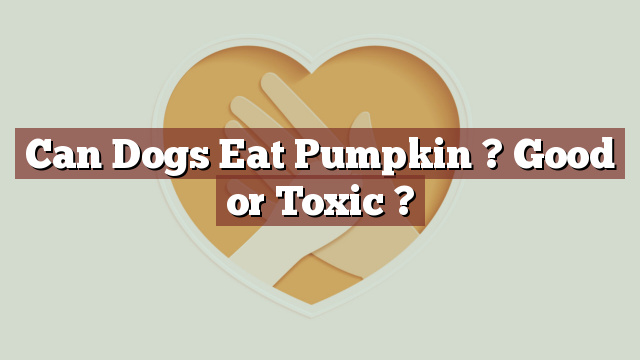Can Dogs Eat Pumpkin? Good or Toxic?
Can dogs eat pumpkin? This is a common question among pet owners who are looking to provide their furry friends with a healthy diet. It is important to be aware of what foods are safe and beneficial for dogs, as well as those that may be toxic or harmful to them. In this article, we will explore whether or not dogs can safely consume pumpkin, and the potential risks or benefits associated with feeding it to them.
Nutritional Value of Pumpkin: Vitamins, Fiber, and More
Pumpkin is a highly nutritious and versatile food that is packed with essential vitamins and minerals. It is low in calories and fat, making it an excellent option for dogs who are watching their weight. Pumpkin is also a great source of dietary fiber, which can aid in digestion and promote a healthy digestive system in dogs. Additionally, pumpkin contains vitamins A, C, and E, as well as potassium and iron, all of which contribute to a dog’s overall well-being.
Can Dogs Eat Pumpkin? Safety and Toxicity Explained
Yes, dogs can eat pumpkin and it is generally considered safe for them. In fact, many veterinarians recommend adding pumpkin to a dog’s diet due to its numerous health benefits. However, it is important to note that dogs should only consume plain, cooked pumpkin. Avoid feeding them pumpkin pie filling, as it may contain additives such as sugar and spices that can be harmful to dogs. Additionally, it is essential to remove the seeds and rind before feeding pumpkin to your dog, as they can pose a choking hazard or cause intestinal blockage.
Potential Risks or Benefits of Feeding Dogs Pumpkin
Feeding dogs pumpkin in moderation can provide several benefits. The high fiber content in pumpkin can help regulate bowel movements and alleviate symptoms of both diarrhea and constipation. This makes it a useful dietary addition for dogs with sensitive stomachs or digestive issues. Furthermore, pumpkin can aid in weight management by providing a feeling of fullness and reducing the overall caloric intake. It can also help support a dog’s immune system and promote healthy skin and coat, thanks to its rich vitamin and mineral profile.
However, it is important to note that excessive consumption of pumpkin can lead to an upset stomach or diarrhea in dogs. Therefore, it is recommended to introduce pumpkin gradually into their diet and monitor their response. If any negative symptoms occur, it is advisable to consult a veterinarian.
My Dog Ate Pumpkin, What Should I Do?
If your dog accidentally consumes a small amount of pumpkin, there is usually no cause for concern. However, if your dog ingests a significant amount of pumpkin or experiences any adverse reactions, it is best to contact your veterinarian. They will be able to provide guidance on the appropriate course of action based on your dog’s specific situation.
Conclusion: Pumpkin Can Be a Healthy Addition to a Dog’s Diet
In conclusion, dogs can eat pumpkin and it can be a healthy addition to their diet. Pumpkin is rich in essential vitamins, minerals, and fiber, making it a nutritious choice for dogs. However, it is important to feed dogs plain, cooked pumpkin and to avoid giving them pumpkin pie filling or the seeds and rind. As with any dietary changes, it is recommended to introduce pumpkin gradually and monitor your dog’s response. If you have any concerns or questions, it is always best to consult with your veterinarian for personalized advice.
Thank you for investing your time in exploring [page_title] on Can-Eat.org. Our goal is to provide readers like you with thorough and reliable information about various dietary topics. Each article, including [page_title], stems from diligent research and a passion for understanding the nuances of our food choices. We believe that knowledge is a vital step towards making informed and healthy decisions. However, while "[page_title]" sheds light on its specific topic, it's crucial to remember that everyone's body reacts differently to foods and dietary changes. What might be beneficial for one person could have different effects on another. Before you consider integrating suggestions or insights from "[page_title]" into your diet, it's always wise to consult with a nutritionist or healthcare professional. Their specialized knowledge ensures that you're making choices best suited to your individual health needs. As you navigate [page_title], be mindful of potential allergies, intolerances, or unique dietary requirements you may have. No singular article can capture the vast diversity of human health, and individualized guidance is invaluable. The content provided in [page_title] serves as a general guide. It is not, by any means, a substitute for personalized medical or nutritional advice. Your health should always be the top priority, and professional guidance is the best path forward. In your journey towards a balanced and nutritious lifestyle, we hope that [page_title] serves as a helpful stepping stone. Remember, informed decisions lead to healthier outcomes. Thank you for trusting Can-Eat.org. Continue exploring, learning, and prioritizing your health. Cheers to a well-informed and healthier future!

